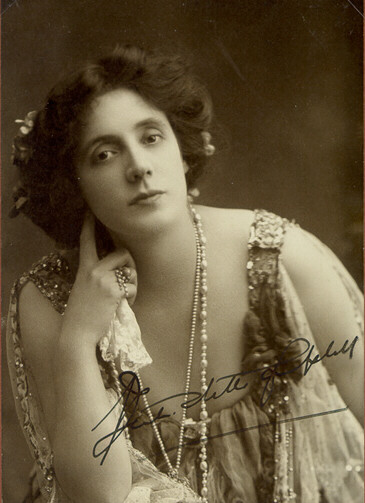Does it really matter what these affectionate people do – so long as they don't do it in the streets and frighten the horses! (ang.)
upominając młodą aktorkę, która uważała, że starszy aktor na scenie okazał zbyt dużo uczucia młodemu odtwórcy głównej roli.
Źródło: Alan Dent, Mrs. Patrick Campbell (1961)
Mrs. Patrick Campbell cytaty
Mrs. Patrick Campbell: Cytaty po angielsku
“The deep, deep peace of the double-bed after the hurly-burly of the chaise-longue.”
Quoted in Alexander Woollcott, “The First Mrs. Tanqueray,” While Rome Burns (1934)
“Success is the ability to go from failure to failure without losing your enthusiasm.”
No definite source has been found for this statement; though most often attributed to Sir Winston Churchill, and sometimes to Abraham Lincoln, it has only rarely been attributed to Campbell.
Disputed
Letter to George Bernard Shaw (1 November 1912) published in Bernard Shaw and Mrs. Patrick Campbell (1952), p. 52; this was later used in the play Dear Liar : A Biography in Two Acts (1960) by Jerome Kilty, an adaptation of the correspondence between Shaw and Campbell.
“She has such pretty little eyes — And they're so close together!”
Comment about actress Norma Shearer, quoted in They Had Faces Then: Super Stars, Stars, and Starlets Of The 1930's (1974) by John Shipman Springer and, Jack D. Hamilton, p. 54
Reply to a young actress who asserted that an older actor in a production showed too much affection for the leading man (c. 1910); as reported by Alan Dent in Mrs. Patrick Campbell, p. 78 (1961).
[horses]Variants: "My dear, I don't care what they do, so long as they don't do it in the street and frighten the horses."
"I don’t mind where people make love, so long as they don't do it in the street and frighten the horses."
"It doesn't make any difference what you do in the bedroom as long as you don't do it in the street and frighten the horses."
"Does it really matter what these affectionate people do, so long as they don't do it on the street and frighten the horses?"
On the internet, a similar comment regarding politicians has been widely attributed to Victor Hugo, but without any definite sources. It appears to be a modern satirical invention, derived from Mrs. Campbell's statements.
